- Home
- Warwick Deeping
The Seven Streams
The Seven Streams Read online
* A Distributed Proofreaders Canada eBook *
This eBook is made available at no cost and with very few restrictions. These restrictions apply only if (1) you make a change in the eBook (other than alteration for different display devices), or (2) you are making commercial use of the eBook. If either of these conditions applies, please contact a https://www.fadedpage.com administrator before proceeding. Thousands more FREE eBooks are available at https://www.fadedpage.com.
This work is in the Canadian public domain, but may be under copyright in some countries. If you live outside Canada, check your country's copyright laws. IF THE BOOK IS UNDER COPYRIGHT IN YOUR COUNTRY, DO NOT DOWNLOAD OR REDISTRIBUTE THIS FILE.
Title: The Seven Streams
Date of first publication: 1911
Author: Warwick Deeping (1877-1950)
Date first posted: Mar. 19, 2019
Date last updated: Mar. 19, 2019
Faded Page eBook #20190343
This eBook was produced by: Al Haines, Mardi Desjardins & the online Distributed Proofreaders Canada team at https://www.pgdpcanada.net
THE
Seven Streams
BY
WARWICK DEEPING
Author of “The Rust of Rome,” “The Red Saint,”
“Uther and Igraine,” etc. etc.
CASSELL AND COMPANY, LIMITED
London, New York, Toronto and Melbourne
MCMXI
ALL RIGHTS RESERVED
TO
My Dear Sister
KATHLEEN
This Dream Romance is Dedicated
“Sleep after toyle, port after stormie seas,
Ease after warre, death after life, does greatly please.”
Spenser, The Faerie Queen.
“Dreams;
Which are the children of an idle brain
Begot of nothing but vain phantasy.”
Shakespeare, Romeo and Juliet.
THE SEVEN STREAMS
CHAPTER I
For a night and a day Tristan le Sauvage had watched his arms before the high altar of the chapel of Purple Isle. For a night and a day he had seen the long tapers glimmering towards their silver sockets, under the painted roof. Dawn light and evening glow had shone through the latticed casements east and west, dusting the stones with colour, carving deep shadows from sculptured pillar and from moulded arch. Not a sound had broken the silence of the tombs. Alone before the Great Cross, Tristan had kept vigil, chastening his manhood for quest beyond the sea. Two months had passed since a great ship with gleaming sails had swooped like a falcon upon Purple Isle, and carried thence that white dove, Columbe the Fair.
The sun had descended in a whorl of crimson flame when Tristan rose up from before the altar, and passed out to his kinsfolk who had gathered at sunset in the chapel court. The moon had climbed the starry port of heaven. In the court lamps flickered, and white faces peered at him like pale flowers out of the gloom. The delicate finials of many cypresses were smitten with the moonlight; a thin perfume of spring quivered in the air.
Before the chapel gate stood Father Madan of the Isle, clad in his Mass robes, his white beard silvered by the light of the moon. Four acolytes stood round him with bell and aspergil, ewer and book. Maidens in white bore garlands of primrose and of violet on crosses of white wood. There was a deep silence through all the court, as Tristan came out from the inmost shadow, his head bowed over his broad chest.
Tristan le Sauvage was no lover of priests. Frocks and stoles were women’s gear. It was with no great grace that he went on his knees on the bare stones at Madan’s, feet, while the old man stretched out his thin white hands over him like a snowy Druid uttering incantations under the stars.
“Son Tristan,” quoth the priest, with that innocent unction beloved of women, “hath the good God chastened thee for this thy quest?”
Tristan hated parade with the great sinews of his heart. He was a surly soul, a bad courtier at the crook of the knee.
“Son Tristan,” said the priest again, “the buckler of Faith awaits your arm.”
“I have sharpened my sword, O Father,” said the man on the stones.
Madan knew well this unpolished rock, the granite that loved the billow’s blow better than the honeyed voice of a lute. He forgave the untamed temper of youth, and blessed him as he knelt at his feet.
His kinsfolk gathered under the long shadows of the cypresses. Dame Joan, his mother, drew near, and kissed his lips. Her hands lay heavy upon his shoulders; her face shone white under her pure grey hair.
“Tristan,” said she, “the good saints strengthen you. Thrice blessed am I in the manhood of my son.”
“Mother,” he answered her simply enough, overshadowing her with his great strength, “God by your love has given me a good schooling. Therefore be comforted. Columbe, my sister, shall return to you again.”
When she had hung upon his bosom, Dame Joan kissed him, as did his sire and Lavaine, his brother. They were brave folk, simple of heart, open-souled towards Heaven. Love with them was as an eternal prayer winging at dawn and eve to the throne of God. Girded from the great world by the waste of waters, they lived their lives in the strong purity of virgin faith.
The full moon gazed on them as they passed down from the chapel towards the sea. A thousand pines thrust up their midnight spears towards the stars. Deep to the confines of the dusky sky the far sea glimmered, washing the island with a sheet of foam. Madan the monk led on the company, acolytes, maidens, and young men chanting together under the moon. Tristan walked at his mother’s side. With solemn song and the faint pulsing of the chapel bell, they brought him slowly towards the strand.
In a black inlet, bulwarked from the broad vigour of the sea, a galley lay moored beside a rude stone quay. The water was scolloped all with silver round the sable rocks. A great glistening highway stretched over the ocean towards the east.
By the galley’s bulwarks Tristan took leave of his mother and his sire. He sprang down behind the thwarts and took the tiller in his hand. The black sail climbed the mast; the long sweeps smote silver from the swirling pool. Madan stood forward and blessed him as the prow rose to the waves. Thus Tristan le Sauvage put out from Purple Isle, and followed the moon’s highway over the sea.
CHAPTER II
The tall hills of a strange land rose athwart the deepening azure of the second dawn. Spears of light fell streaming towards the sea, glittering upon the ever-tumbling waves that hurried onwards towards the west. The stars sped back behind the veil. The faint moon grew frail as a great silver net burdened with transient dew.
Tristan le Sauvage, steering the boat, sat with his eyes fixed upon the misty heights touched with the golden glories of the dawn. Before him the multitudinous waves leapt and tumbled, washing the bulwarks, plashing against the prow with a moist unrest. A light breeze bellied the black sail, set the cordage creaking and humming about the mast. The world seemed full of the awakening day and the sinuous and solemn splendour of the sea. The waves were troughed with opalescent light as they swept and heaved about the boat. There was a salt zest in the ocean’s breathing, a deep intake of strength into its panting heart.
The men at the benches watched Tristan le Sauvage as they dipped their sweeps. The dawn light shone upon his rugged face and the links of his hauberk. There was no uglier man in Purple Isle than Tristan le Sauvage. Nature had juggled with him from his earliest years. Of no great stature, he was like a tough oak, cumbrous, huge of trunk, and gnarled of limb. The long arms showed their great muscles even under the sleeves of his hauberk. His chest was as the front of some great rock; his heavy head seemed sunk betwixt his shoulders; his legs bowed as by the massive strength above. A pair of dusky eyes peered out with honest fai
th from a craggy, hairless countenance. The broad mouth was pursed up half morosely over the strong white teeth.
Such was the pilgrim who plied the tiller, helming the boat towards the broadening day. Tristan spoke seldom, crying now and again to Rolf the pilot, as the boat heaved and rolled over the waves. His eyes were fixed on the hills that rose above the waste of waters. Black cliffs, craggy and solemn, began to frown upon the sea. The far heights bristled with woodland, shimmering with magic mystery under the rising sun. The moist surge of the sea cheered on the galley towards the shore.
Tristan stood to the tiller, and scanned the strange coast under his hand. The wind freshened, the sail bellied from the mast, the toilers drew in their oars, and watched the coast-line rising from the foam. Like battlements of black marble, the cliffs towered above the blue shallows, with rocky pinnacle and forest spire smitten from the east with a glamour of gold. Precipice and wooded height were solitary as the sea itself. No tower crowned the headlands, no town lurked in the green shadows of the placid bays.
Rolf, old senator of the seas, stood forward in the prow, gazing at the line of heights. Straight to the east a narrow valley thrust upwards from the sea, walled on either hand with cliff and forest slope. Rolf hailed Tristan to the prow, and pointed with knotted finger to the shore.
“The Land of the Seven Streams, sir,” he said to him. “I know these cliffs of old. See yonder valley; the Silver Snake runs therein, a great river and a strong. The stars have steered us well. Hold for the opening in the cliffs; we can ride in over the bar.”
Running fast on the backs of the billows, they came to where a counter current beat upon the prow, fretting the sea into contending streams. It was where the river charged the tide. The galley swerved and faltered; the sail flapped against the mast.
“Out sweeps,” came Rolf’s hail from the prow. “Pull, lads; ware rocks to the north. The passage lies ahead.”
With the sail lowered and much straining of oars, they swung in past the rocky barriers where the waves chafed and broke in foam. The great cliffs towered upon either hand, solemn and stupendous, tufted with dwarf oaks, topped with pines. Once within the inlet, the galley ran smoothly on the broad bosom of the river, whose curves smote landwards into forest gloom.
The men rested on their oars while Tristan climbed into the prow and stood beside Rolf the seaman, looking forth over crag and forest. No plume of smoke ascended to the sky, no roofs shone out amid the green. The place was steeped in the grandeur of solitude, and there was no sound to break the silence save the perpetual plaining of the sea.
Tristan questioned the old man at his side; he had grown grey under many winter skies over stormy seas; his beard was as the foam below the bluff beak of a ship.
“Whence comes this river?” he asked him.
“Sir,” he answered, “this great river feeds upon the Seven Streams, and like a vast snake, takes them all into its belly. We have entered in at the sea gate of the land.”
“Who are its rulers?”
“Sir, there are many lords in the land, holding their fiefs direct from the King. Southwards lies the duchy of La Marche Montagne, northwards the duchy of Blanche the Bold.”
Tristan pondered his words, as the river sped past them to the sea.
“Hold on,” he said, “and bear me higher into the heart of the land. What better path for us than this broad stream?”
As they passed on that day the heights descended, spreading eastwards into wooded hills. The land grew milder and more green of face. Ancient trees sentinelled the river; broad valleys swept from it under the sapphire sky. Hills grey with olives, dusky with cypresses and firs, rose from green meadows, sleek and brilliant under the sun.
About noon, they rounded a rocky point, where myrtles clambered up the bluff brow of the hill. In the northern shallows they saw a boat moored and a peasant fishing. As the galley drew near with a steady pulse of oars, Tristan stood in the prow and hailed the man over the water. The fisherman fingered his line, and sat staring none too trustfully at the galley sliding towards him with ripples prattling at its prow. Strange ships sailed seldom into those quiet waters; the bloody deeds of Norse pirates still lived in the heart of the peasantry.
Tristan, seeing the man’s distrust, tossed him a piece of silver from the leather purse at his girdle. The fisher groped for it amid the cordage at the bottom of the boat. Questioned, he told them of the knights and barons of those parts, of the castles and hamlets therein, of the roads and forest ways. His lord was a certain Sir Parsival, who held a tower perched upon a neighbouring hill. Lastly, he described the region known as La Vallée Joyeuse, a rich and pleasant pasture land, where vineyards purpled the hills, and Sir Ronan the Peaceful had his home.
Tristan, leaning on his sword, bade his men pole in towards the northern bank, where a stretch of meadowland swept to the myrtle thickets that hid the rocks. The water lay still as glass in the shallows. The woods cast purple shadows athwart the stream, and the meads stood thick with many flowers. The galley ran aground in a little inlet where reeds and rushes bearded the bank. Tristan leapt from the prow, found sure footing, and turned with a smile to face his men.
“Good voyage and a clean sea to you,” he said.
They crowded to the bulwarks with many rough and rugged prayers, holding up their caps to him, proffering their service. Grizzled sea-dogs that they were, they loved, him, even because he was strong and generous, and a giant in arms. Like Homeric mariners gathering round Ulysses at the entry to Hades, they prayed him to share with them the perils of the unknown. Tristan put them off with bluff but unbending gratitude. They would have hindered him, sea-dragons that they were. Such a pilgrimage as his required but a single sword.
“Good men that you are,” he said, buckling his shield over his shoulders, “you ride the waves better than the back of a horse. When I have need of brown sails and a strong keel, I will send to Purple Isle and call you over. To my sire and to Dame Joan, my mother, commend me.”
They tossed their rough blessings on him as he climbed the bank, rattled the sweeps in the rowlocks, waved their fur-lined caps. Tristan saluted them with his drawn sword, a warm colour on his ugly face. They were still watching him and waving their brown fists when he disappeared from their sight into the woods.
There was a strenuous tone in the man’s stout heart that day. The world lay open at his feet, like a broad and glorious plain, unfolding its many phases to his ken. Tristan, great boyish Titan, with a heart of gold, welcomed the sun as it smote through branches upon his face. He was glad of the woods and of their solemn liberty, glad of the hills, and the broad, beaming valleys. Purple Isle had held him overlong in its girdle of foam. The wide world smiled on him; the beacon of romance burnt red upon the hills.
He followed the path that morning that the peasant had described to him, a path that wound over uplands under the shadows of ancient trees. The woods were virgin to Tristan’s heart. There were no such broad-shouldered giants in Purple Isle with its waving pines and stunted myrtles. The great oaks stood to him for sinew and strength. Their gnarled loins spoke of the sap of centuries, their limbs of a hundred battles with the wind. Youth ran riot in him that April day. He was as a Bacchanal intoxicated with the wine of being. He smote the great trees as he passed, bluff, open-handed buffets that would have shaken a Hercules. Once, in the joy of strength, he grappled an oak sapling as he would have grappled a python, wrestled with it, bent it beneath the might of his broad back till the stem splintered and surrendered to his grip. He tossed the broken tree aside with the smile of a conqueror, strode on through the woods, singing as he went.
He had come to the brim of a valley, and had halted to gaze over the meadows with their dark knolls of trees, when a shrill cry stirred him like a wail of a hostile trumpet. Wild and inarticulate, it eddied through the woods, terror breathing in the cry, as of life struggling in the toils of death. The voice grew and gathered, died again into an eerie whimper. Tristan, stiff as a wooden
image, heard it with quickened pulses and a sudden solemnity that overspread his countenance like a cloud.
Pushing through a thicket of hollies, he came to a great break in the woods, where the forest gloom gave place to an open valley, a golden bowl brimming with sunlight. In green meadows a castle stood amid the windings of a stream. Peace seemed throned above the olive thickets, the shimmering water, and the gilded meadows. Yet from a stone bridge that linked the sandy highway where it crossed the stream, there rose other voices to denounce the dream.
Tristan, standing under the woodshawe, beheld a knot of figures swaying to and fro over the keystone of the bridge. Swords were tossing, men struggling together betwixt the parapets. The few seemed caught and trampled by the many. Even as he watched, a horseman broke from the pool of grappling, foining figures, and galloped northwards up the sandy road. An archer, standing on the parapet of the bridge, loosed a shaft at the fugitive, a shaft that found its billet in the rider’s back. Tristan saw him thrust his arms to the sky, twist in the saddle, and fall heavily to earth. His horse, whinnying with fear, left the high road, and cantered over the fields towards the thicket where Tristan stood.
Tristan was not a youth given to the subtle balancing of thought. Being barren of all fear, save the fear of God, he obeyed without debate the prick of impulse. Leaving the thicket, he hallooed to the riderless brute trotting towards him over the meadows. The horse halted, tossed up his head with ears agog, pawed the earth as he cast about from side to side. It was a superb beast, black as a raven, with a single white star on the forehead. Tristan called to him, advancing step by step. There was a magic in the man that made all wild things trust him and obey. The great beast suffered him to approach over the grass. Tristan’s hand touched the sleek, foam-flecked muzzle. He caressed the brute’s ears, took firm hold of the bridle, mounted at one spring, knew himself the master.

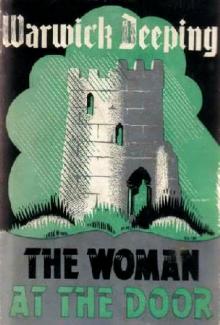 The Woman at The Door
The Woman at The Door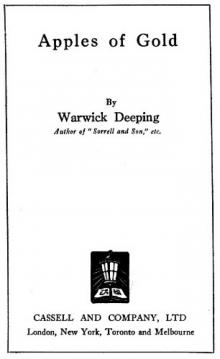 Apples of Gold
Apples of Gold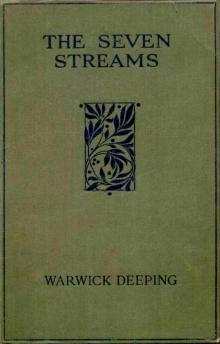 The Seven Streams
The Seven Streams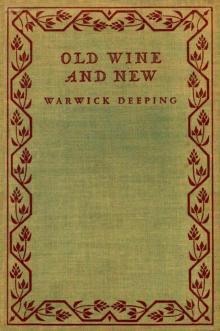 Old Wine and New
Old Wine and New No Hero-This
No Hero-This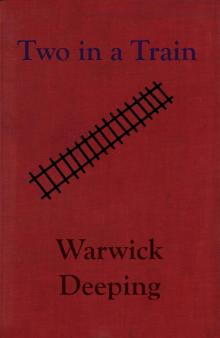 Two in a Train
Two in a Train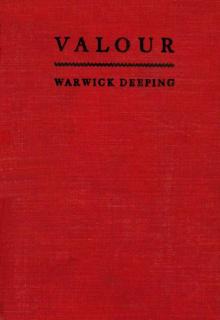 Valour
Valour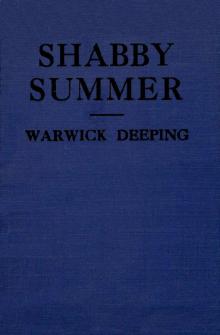 Shabby Summer
Shabby Summer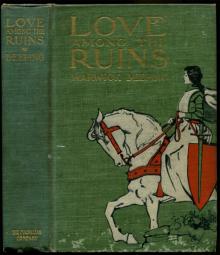 Love Among the Ruins
Love Among the Ruins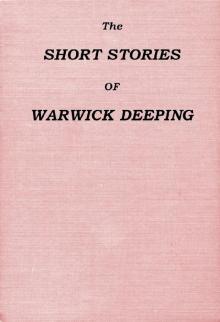 The Short Stories of Warwick Deeping
The Short Stories of Warwick Deeping